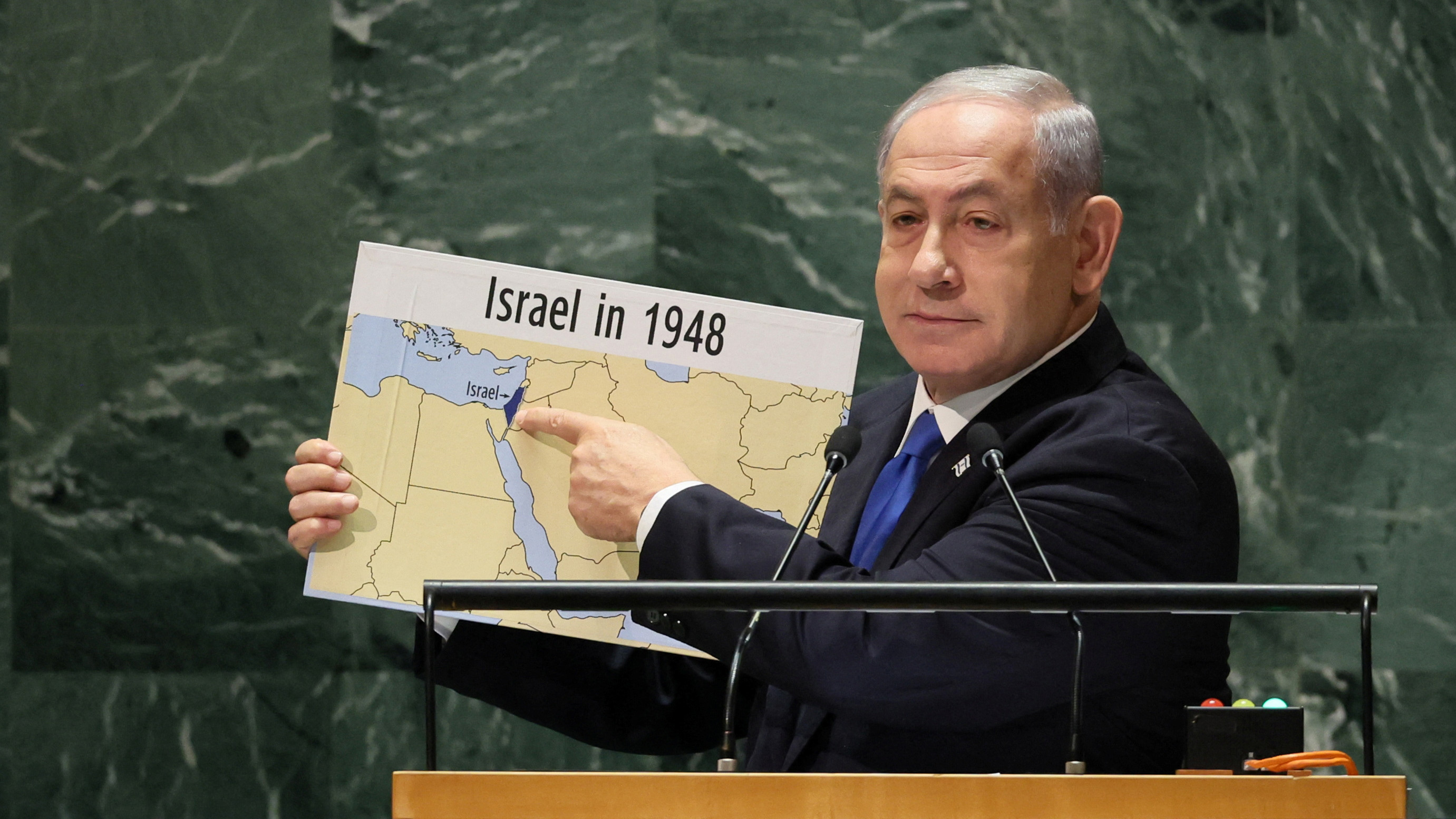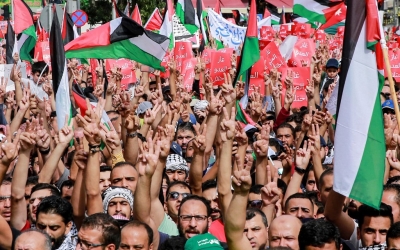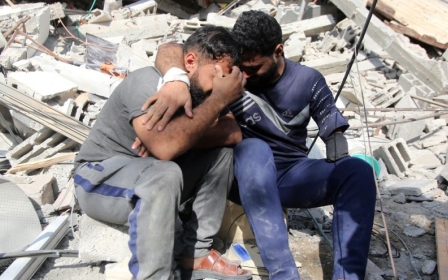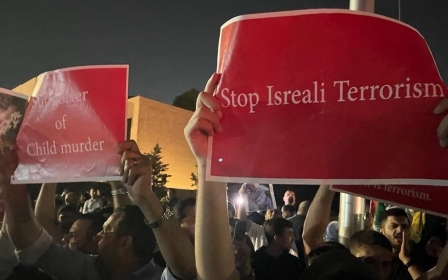Israel-Palestine war: By destroying Gaza, Tel Aviv is opening a huge front in Jordan
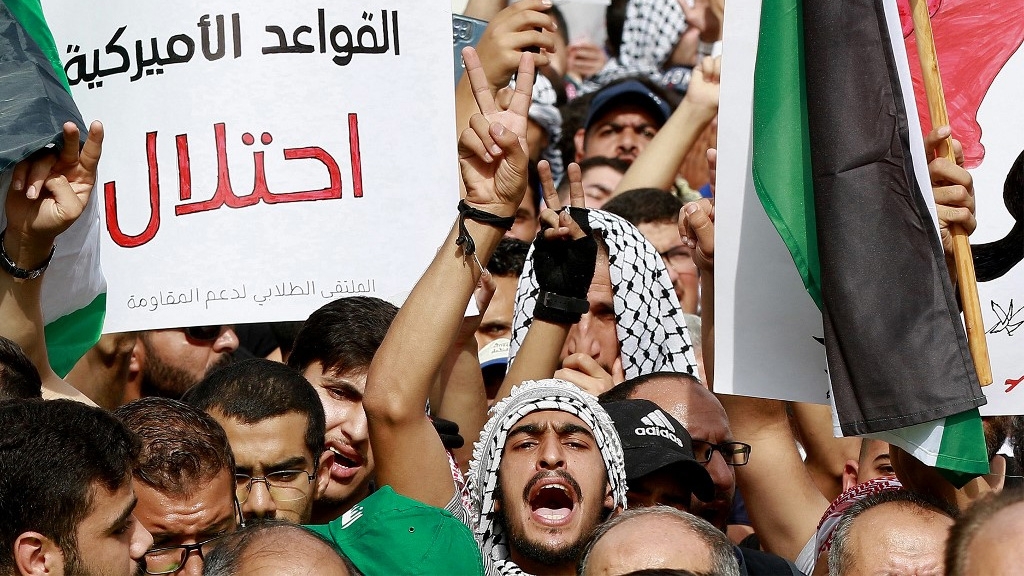
From the ruins of a fourth-century church and monastery on Mount Nebo - which according to Deuteronomy, God commanded Moses to climb to view the Promised Land before he died - Palestine unrolls like a carpet before you.
In the foreground is the Jordan Valley; in the middle distance, Jericho. On the horizon, the lights of Jerusalem twinkle.
It’s a spot chosen by Christian leaders as a symbol of peace. In 2000, Pope John Paul II planted an olive tree next to the Byzantine chapel. Pope Benedict visited a few years later.
As the crow flies, the nearest crossing on the Jordanian border is as close to the southern tip of Tel Aviv as Gaza is. Israel’s leaders and people would do well to remember this simple fact - for it is not to Egypt or Lebanon that they should be looking to judge the fallout of this war, but eastwards to Jordan.
The kingdom has been shaken from top to bottom by Israel’s declared and actual attempts to empty Gaza of its people.
From the top, Queen Rania, the king’s Palestinian wife, has accused western leaders of a “glaring double standard” for failing to condemn the deaths of civilians under Israeli bombardment.
Prime Minister Bisher Khasawneh said the displacement of Palestinians was a red line for Jordan and a fundamental violation of the peace treaty his country had with Israel, while Foreign Minister Ayman Safadi said it would amount to a “declaration of war”.
From the bottom, feelings are running higher still. When Abu Ubaida, a spokesperson for the Qassam Brigades, called on Jordanians to rise, the response was only too swift.
A tribal leader in al-Mazar chanted: “To Abu Ubaida, the only person to mention Jordan’s favour. We hear it for the first time that Jordan is a nightmare for the Zionists. Palestine for us Jordanians is not stones and clay. Palestine for Jordanians is not figs and olives. Palestine for a Jordanian is faith and religion. From the proud al-Mazar, a greeting to Abu Ubaida. From the proud Karak, a greeting to Gaza.”
Peace treaty under review
Nor should we dismiss as rhetoric the surge of support among Jordanians for Hamas, which is designated as a terrorist organisation by Israel and other nations, including the UK, but not by Jordan.
Khasawneh is right. Any forced displacement of Palestinians from any part of Palestine could be cause for Jordan to tear up its peace treaty with Israel, which has withstood three decades of this conflict.
Follow Middle East Eye's live coverage for the latest on the Israel-Palestine war
For a start, this fact is written into the document. Article 2.6 of the treaty that King Hussein signed with Israel’s then-prime minister, Yitzhak Rabin, states that “within their control, involuntary movements of persons in such a way as to adversely prejudice the security of either Party should not be permitted”.
It is therefore not for nothing that the Jordanian parliament is reviewing the treaty, or that Jordan has refused to sign a UAE-brokered deal in which Jordan would supply Israel with electricity in return for water.
Marwan Muasher, vice president for studies at the Carnegie Endowment for International Peace, is a repository of the wild swings of Jordan’s relations with Israel. Muasher opened Jordan’s first embassy in Israel. As foreign minister, he played a central role in developing the 2002 Arab Peace Initiative, which proved to be the last real chance for a two-state solution based on Israel’s 1967 borders. If anyone believed in land for peace, it was him.
With the insouciance of the victor, Israel has always used Jordan as a buffer zone at best
Today, he strikes an increasingly pessimistic tone. He rightly points out that Israel’s bombardment of Gaza has revived longstanding Jordanian fears that Israel may create or use conditions of war to push a large number of Palestinians from Gaza into Egypt, and from the occupied West Bank into Jordan.
Israel’s desire to do so is hardly a secret. Ideologically, Likud from Menachem Begin onwards have always thought of Jordan as an alternative homeland for Palestinians. Two government ministers - to the right of Likud - openly say that Palestinians have no right to live in the West Bank, and one of them, Finance Minister Bezalel Smotrich, is the first government minister to oversee civilian life in the occupied territory.
Muasher wrote in a recent Carnegie commentary: “From Jordan’s perspective, mass transfer has become a real possibility, not just a theoretical argument. If Israel does not want either a Palestinian state or a Palestinian majority, then the only alternative is to try to affect a mass transfer of as many Palestinians as possible … So far, the war conditions have applied only to Gaza. But Jordan is concerned that Gaza might set a precedent for a similar escalation in the West Bank.
“Already, settler groups are raiding Palestinian villages daily with the backing of the Israeli army, driving Palestinians out,” he added. “This creates the impression that radicals in the Israeli government see the current war in Gaza as an opportunity for ethnic cleansing in the West Bank.”
Fears of a holy war
King Hussein never managed to replicate the warmth of the relationship he had with Rabin with Prime Minister Benjamin Netanyahu, the man who ordered the attempted assassination of Hamas leader Khaled Meshaal, and who was forced by Hussein to provide the antidote to the poison that Mossad agents had injected into their target.
King Abdullah has fared little better despite his Sandhurst education and Atlanticist leanings. With the insouciance of the victor, Israel has always used Jordan as a buffer zone at best. And it was not lost on the Hashemites that one key driver of the push to normalise with the Saudi kingdom was Israel’s plan to supplant Jordan’s historic role as custodian of the holy sites in Jerusalem. Fears that Israel’s changes to the status quo at Al-Aqsa Mosque would spark a holy war with the Islamic world have been voiced by those close to the Jordanian royal family.
At worst, Israel has viewed Jordan as an inconvenience to be bypassed, along with the Palestinians, in glittering trade deals with the oil-and-gas-rich Gulf. All of this had been building steadily in Jordanian minds, long before Netanyahu waved his map of Israel, from which Palestine had been wiped, at a recent meeting of the United Nations General Assembly.
There is, however, a deeper reason for Jordanian alarm, and for the certainty that Israel should not be allowed to succeed in Gaza.
From the 1970s onwards, Palestinians - who make up around 60 percent of the population in Jordan and hold Jordanian citizenship, with the exception of refugees from Gaza - thought of themselves as spectators each time war broke out. After the civil war ended with the expulsion of the Palestine Liberation Organisation (PLO), the Palestinians of Jordan lost all sense that they were involved in the conflict. The king did not allow PLO factions to have any mass presence in Jordan.
When Hamas became dominant in the Palestinian diaspora, it too was kicked out. The Muslim Brotherhood in Jordan and Hamas had, as one leading member described it, a “complicated and controversial” relationship after Hamas moved its leadership from Jordan to Syria in 1999.
The ructions subsided only when each agreed to coexist, but the Islamic movement was left riven with splits, mainly over whether priority should be given to the Palestinian cause over Jordan’s domestic agenda. Hamas has no membership or root organisation in Jordan, unlike in Lebanon or Syria. Islamists in Jordan are part of the Brotherhood.
Raising the stakes
Today, much of this is history. Conversations in Amman among Palestinians go along very different lines.
One Palestinian from Amman told me: “We in Jordan, Palestinians and Jordanians, have closer links to Palestine than [Hezbollah leader Hassan] Nasrallah has. We are Sunnis. We come from the same tribes. How can we blame Hezbollah for not doing more, while we only take part in demonstrations? This cannot continue.”
The plain truth is that the reawakening of Palestinian identity that spurred civil unrest in the mixed cities of Israel in 2021 among Palestinian citizens of Israel, is happening now in Jordan.
This has huge implications. For Palestinian armed groups, it opens up a huge reservoir of potential recruits, money and weapons.
Support for Hamas crosses ethnic divisions in Jordan. East Jordanians are, if anything, just as committed to striking back at Israel. One of the leaders of an important tribe, Traad al-Fayez, who is from the Fayez branch of the Bani Sakher tribe, told a local journalist: “We all support Hamas and the resistance. Jordanians and Palestinians are united against Israel.”
But Hamas does not need to conduct a sales drive in Jordan. There is no bigger spur to action than the actions of settlers and the settler-led Israeli army in the occupied West Bank.
Nine days ago, a page appeared on Facebook with the message: “To the people of Jenin: 9 days. Leave now … emigrate to Jordan.” The message was accompanied by a video showing the route Palestinians of Jenin should take to Irbid in the north of Jordan. Facebook took the page down after a barrage of complaints.
Exactly nine days later, the Israeli army announced that Jenin was a closed military area, in an operation that is still ongoing.
Israeli settlers are on the move, and the land they really want would extinguish a Palestinian state forever
As US Senator Mark Warner, chairman of the intelligence committee, has noted, most of the reservists being called up by the Israeli army come from the families of settlers. To look to the army to curb attacks on Palestinian towns in the occupied West Bank is a fool’s errand, as they are increasingly one of the same band. All they do is swap uniforms.
Jordan is doing what it can. It has closed and reinforced the border to stop Palestinians from being pushed over by settlers, and it has established a field hospital in Nablus.
With each passing day of the Gaza war, the stakes for the region are increasing. The belief in Washington that Palestine can be calmed by a resumption of the very process that Muasher, for one, devoted much of his career to, is a fundamental error.
Israeli settlers are on the move, and the land they really want would extinguish a Palestinian state forever. The mood gripping Israel is raw. Israel wants a fight to the finish. As one, they seem to be telling themselves: “It’s either us or them.” A ceasefire in Gaza will not stop this.
Little do they know that by destroying Gaza, Israel is opening a huge front on its eastern flank - a front that has been quiet for the past 50 years.
It will be quiet no longer.
The views expressed in this article belong to the authors and do not necessarily reflect the editorial policy of Middle East Eye.
This article is available in French on Middle East Eye French edition.
Middle East Eye propose une couverture et une analyse indépendantes et incomparables du Moyen-Orient, de l’Afrique du Nord et d’autres régions du monde. Pour en savoir plus sur la reprise de ce contenu et les frais qui s’appliquent, veuillez remplir ce formulaire [en anglais]. Pour en savoir plus sur MEE, cliquez ici [en anglais].



